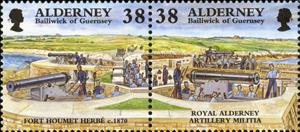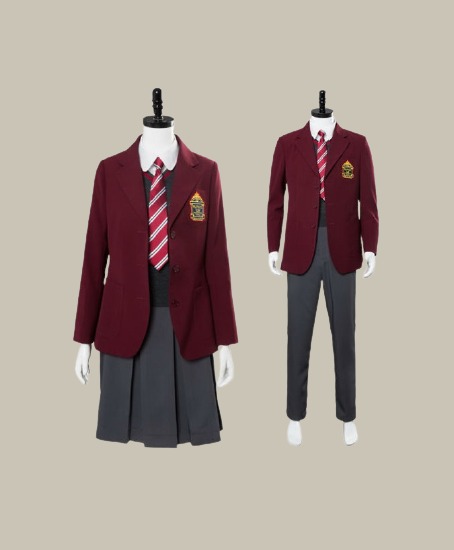Se-tenant: 2nd Bn, Royal Scots on Parade / Garrison at Work, (Alderney 1999)
2nd Bn, Royal Scots on Parade / Garrison at Work, (Alderney 1999)
19 October (Alderney ) within release Garrison Island 1999 - Forts goes into circulation Se-tenant 2nd Bn, Royal Scots on Parade / Garrison at Work, face value 2*38 Guernsey penny
| Se-tenant 2nd Bn, Royal Scots on Parade / Garrison at Work, in catalogues | |
|---|---|
| Michel: | Mi: GG-AL 143-144 |
| Stamp Number: | Sn: GG-AL 141a |
| Stanley Gibbons: | Sg: GG-AL A138a |
Se-tenant is horizontal format.
Also in the issue Garrison Island 1999 - Forts:
- Se-tenant - 2nd Bn, Royal Scots on Parade / Garrison at Work, face value 2*30;
- Se-tenant - 2nd Bn, Royal Scots on Parade / Garrison at Work, face value 2*38;
- Booklet Pane - Alderney Militia Infantry in the 1930s face value 2*20_2*30;
- Se-tenant - Field Gun & Crew / Parade of 9th Bn Royal Garrison Artillary face value 2*20;
- Se-tenant - Field Gun & Crew / Parade of 9th Bn Royal Garrison Artillary face value 2*25;
- Booklet Pane - Fort Albert viewed from St Anne's (c. 1935) face value 2*30_2*38;
- Booklet Pane - Fort Tourgis (c. 1859), engraving from a drawing face value 2*25_2*30;
- Booklet Pane - Platte Saline Battery c. 1900, with the SS Courier face value 2*20_2*25;
- Booklet - Prestige Booklet - Garrison Island Part III face value 6.78;
- Booklet Pane - The Arsenal from Fort Albert (recent photograph) face value 2*25_2*38;
- Booklet Pane - The Royal Alderney Artillery Militia on parade face value 2*20_2*38;
Se-tenant 2nd Bn, Royal Scots on Parade / Garrison at Work, it reflects the thematic directions:
An anniversary is the date on which an event took place or an institution was founded in a previous year, and may also refer to the commemoration or celebration of that event. For example, the first event is the initial occurrence or, if planned, the inaugural of the event. One year later would be the first anniversary of that event. The word was first used for Catholic feasts to commemorate saints. Most countries celebrate national anniversaries, typically called national days. These could be the date of independence of the nation or the adoption of a new constitution or form of government. The important dates in a sitting monarch's reign may also be commemorated, an event often referred to as a "Jubilee".
A military, also known collectively as an armed forces, are a heavily armed, highly organized force primarily intended for warfare. Militaries are typically authorized and maintained by a sovereign state, with their members identifiable by a distinct military uniform. They may consist of one or more military branches such as an army, navy, air force, space force, marines, or coast guard. The main task of a military is usually defined as defence of their state and its interests against external armed threats.
A uniform is a variety of costume worn by members of an organization while usually participating in that organization's activity. Modern uniforms are most often worn by armed forces and paramilitary organizations such as police, emergency services, security guards, in some workplaces and schools, and by inmates in prisons. In some countries, some other officials also wear uniforms in their duties; such is the case of the Commissioned Corps of the United States Public Health Service or the French prefects. For some organizations, such as police, it may be illegal for non-members to wear the uniform.



